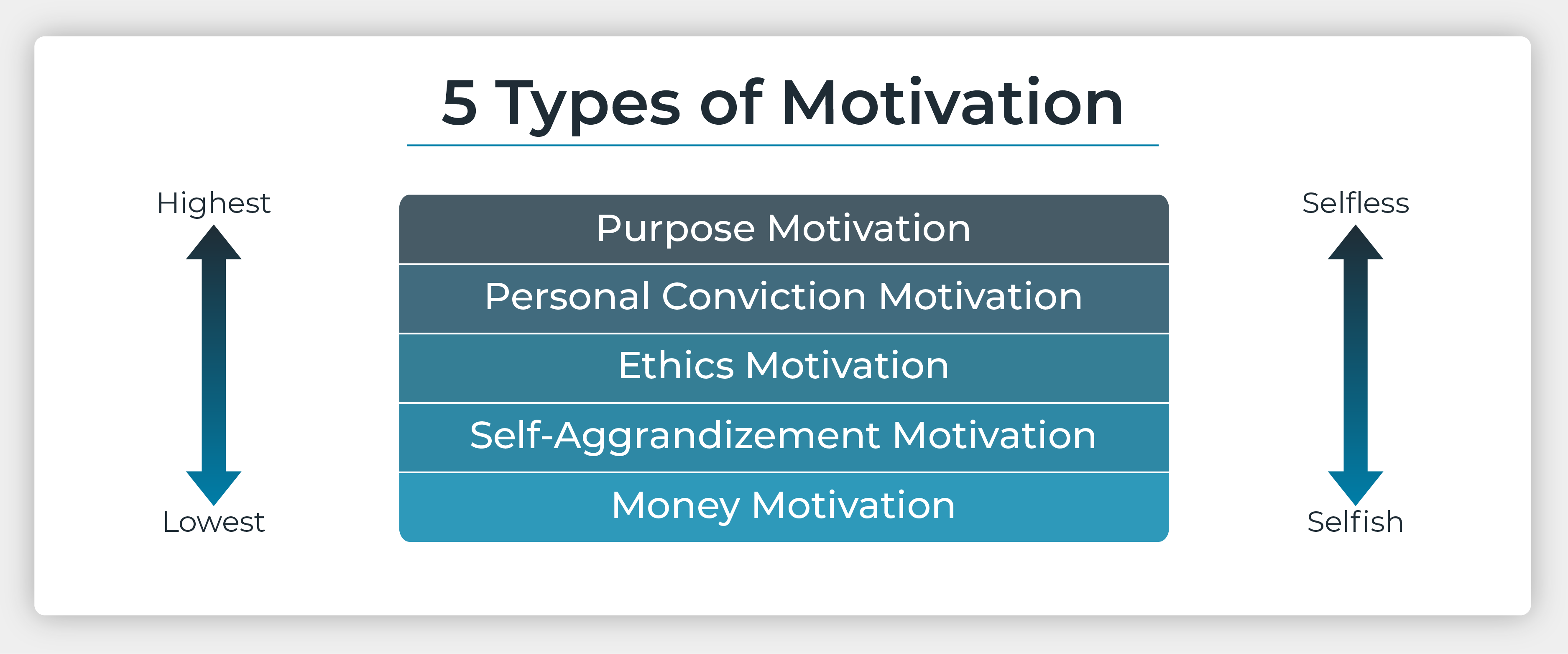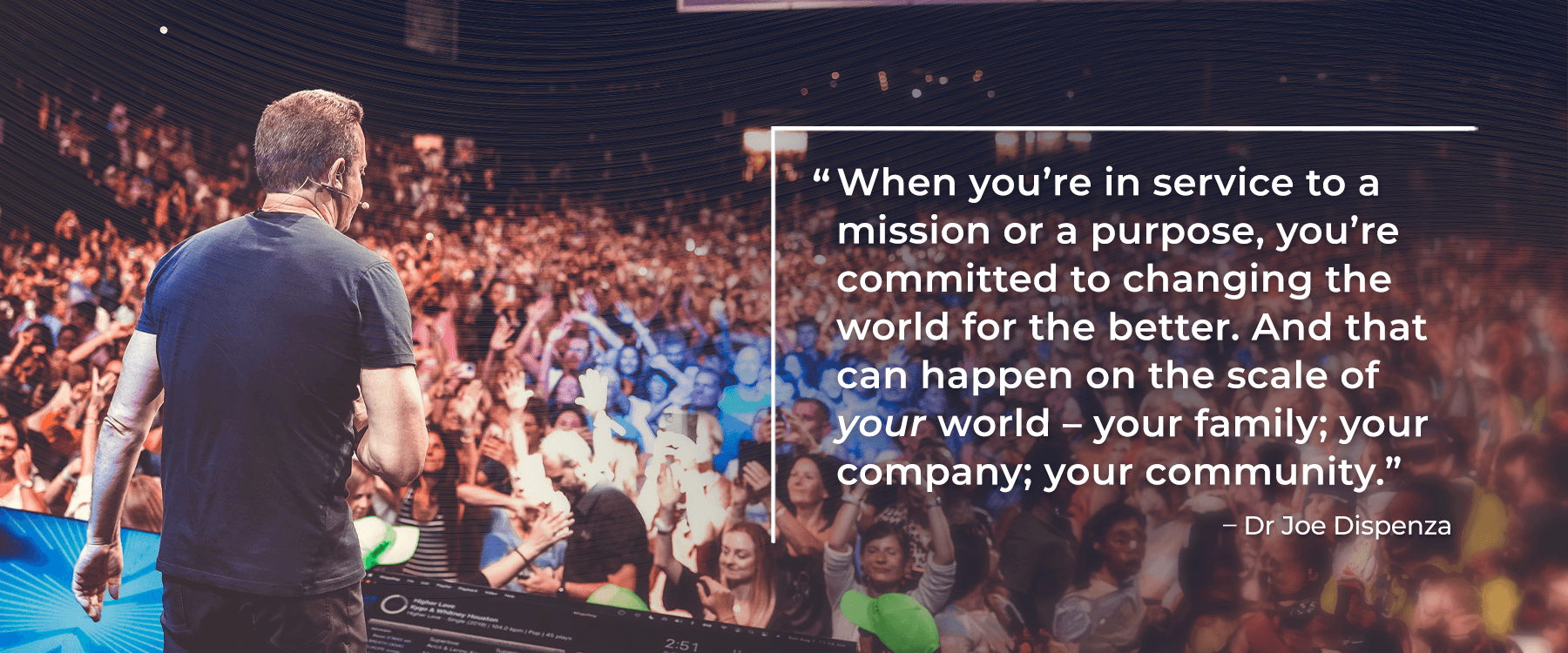Discovering Your Purpose:
The Five Types of Motivation
Dr Joe Dispenza | 12 March 2024
I was so happy to see the response to my recent posts about making this your year to change. So many of you wrote to share your own sense of purpose, the commitment you’re making to change, or areas of challenge in your practice. And I was struck by this question, which may resonate with many of you:
“What is the purpose or the mission? ‘I want to change individuals to change the whole’? … ‘I want to be a good father and husband; create an abundant life for us’? ... ‘I want to become a really happy person this year’? The big mission seems sometimes not as inspiring as the smaller ones.”
Of course, there’s no single answer that applies to even one person, let alone all of us. But if you’re also attempting to understand or define your purpose or mission, there is something that can help you in your discernment – and that’s what I refer to as the five types of motivation.
1. Purpose Motivation
The first, or highest, form of motivation is purpose motivation. We also can refer to this as “mission” or “duty” motivation. Just as the name suggests, this is when you’re inspired by a higher calling; a sense of purpose that drives you toward a vision – a vision bigger than you alone.
When you’re purpose-driven, you’re committed to serving others or changing the world in some way. It’s when you have a vocation that considers more of the whole. You want to impact as many people as possible – and that’s what makes purpose motivation the most selfless form of motivation. Being in service to others is what gets you out of bed in the morning.
I think some people might struggle with what it means to have a higher purpose – because they think it must mean something grandiose or out of reach. All of us can summon the image of people in history who clearly were motivated by a grand vision for what the world could be. Just imagine some of the greatest innovators, philosophers, and activists – and you’re picturing people who were motivated by a mission.
That doesn’t mean, though, that you have to be operating on a global scale. It simply means you see a possibility for a better world – and that’s what motivates you.
When you’re in service to a mission or a purpose, you’re committed to changing the world for the better. And that can happen on the scale of your world – your family; the culture at your company; your community.
2. Personal Conviction Motivation
Right under purpose or duty motivation is personal conviction motivation. This is when you say, “I’m going to do this – because I said I was going to do it.” If you’re operating under personal conviction, you’re what’s known as a “self-starter.” You’re disciplined and entrepreneurial in your efforts.
Personal conviction motivation also is a high form of motivation – but not the highest form. It’s possible to be motivated or driven through personal conviction or discipline – but without having a sense of higher purpose.
However, it makes sense that people who have purpose motivation inherently have personal conviction. Their principles are in alignment with their purpose – because they have a reason to get up every day.
In other words, when you have a mission; a vision; a purpose ... you naturally also have personal conviction.
3. Ethics Motivation
The next form of motivation is ethics motivation – or “morality-based” motivation. As you might guess from its position halfway through the list, this is neither the highest nor lowest form of motivation; it’s sort of the middle of the road.
In short, ethics motivation is based on polarity: Good or bad. Right or wrong. Success or failure. Sin or repentance. A lot of models and doctrines are based on this approach to the world. It can be a short-sighted form of motivation; as anything that polarizes us involves a kind of judgment that narrows our view – and our influence. So, while you might be guided by a strong sense of ethics, you might be missing a sense of personal conviction – or higher purpose.
But we know from our research that people who have purpose motivation and are personally convicted also have a great sense of ethics and morality. When we’re guided by something bigger than we are, that aspect falls right in into place.
4. Self-Aggrandizement Motivation
The next kind of motivation is called self-aggrandizement or “ego-centered” motivation. This is pretty straightforward. If you’re driven by acclaim, recognition, status, or popularity, you’re motivated by self-aggrandizement.
By now, you’ve figured out there’s a hierarchy at work here. As we go down the list, from one through five, the field of vision becomes narrower ... and the form of motivation becomes more self-centered.
As so we know, then, this is not a very high form of motivation. And any gains made within its structure tend not to last, in terms of satisfaction and impact.
And yet: people who have purpose motivation, personal conviction, and a strong sense of ethics tend to naturally receive recognition. You can think of it as an unintended “side-effect” of those higher forms of motivation.
5. Money Motivation
This probably needs the least amount of explanation. Money motivation is the lowest – and most selfish – form of motivation. People who are motivated solely by financial gain will always take care of their own needs first.
You’ve no doubt encountered someone who was money-motivated – and you probably knew it within moments of meeting them.
Now, plenty of people in this work are working on creating abundance. And if that’s one of your goals, there’s nothing wrong with that. What I’m talking about is what inspires you – what principles guide your thoughts, feelings, and behaviors. The question becomes: Why are you driven to be abundant?
And – as the pattern described above shows with other forms of motivation – if you’re motivated by money alone, you may generate wealth, but your life probably will lack deeper meaning beyond that. Conversely, we know that if you have a strong sense of purpose ... a deep personal conviction ... a strong sense of ethics ... and if you’ve achieved some amount of recognition ... then money naturally follows.
Broadening Your View
As with every other aspect of this work, the opportunity in understanding the five types of motivation is increasing your self-awareness – so you can make informed choices and commitments within your practice. This isn’t about judgment or shame. It doesn’t matter where you place your own current level of motivation within the hierarchy; it matters that you make the unconscious conscious – so you can decide who you want to be.
What I’ve seen, time and again, is people who come into this work determined to create great wealth. Or, they might be driven by a desire for fame and status – or what feels like a truly defining sense of morality. And they might indeed achieve the goals they set within those values.
But what inevitably happens – once they receive the wealth, the fame, or the vindication – is, they come up against a feeling of emptiness. They realize they want to be part of something greater – otherwise, what is this all for?
And that is a great moment, because it means they’re ready to broaden their view of the world – and to make more of a contribution to others.
Knowing By Heart
Finally, I’ll share with you something I told the participants at our most recent retreat. Your own practice can be your purpose.
You might decide to join a Coherence Healing™ group and commit your time and energy to giving life to another’s life. That mission would be changing a part of the world. You might decide to sit down with yourself every morning, determined to get up from your meditation as a different person – one who is going to practice with your eyes open. One who is going to change the world through love, presence, and kindness. That’s also being an example for the world – and it’s a selfless purpose.
You might set the intention to catch yourself in moments of reactivity and ask yourself: “What would love do?” and then change your response, allowing you to be more present for your family and loved ones – and an example for your children. They, in turn, might change others’ lives through their own practice, as they follow the example you’ve modeled for them.
Every time you show up in this way, you’re evolving our community – and you’re changing the world.
It’s important to ask yourself where you are on your path – and what brings the most meaning to your life. And, when you finally discover your calling, it won’t just be something you think about in your mind; it will become visceral for you. It won’t be something you identify through thought or language alone; it will resonate in mind, body, heart, and soul.
In other words, you may define it in your head, but more important: you’ll know it in your heart. And that’s my wish for you.
***
To learn more about aligning your goals with your purpose, read Dr Joe’s Blogs: Is This Your Year? Part I – Purpose, Goals, and Intentions, and Is This Your Year? Part II – Getting Lost in the Act.

Comments